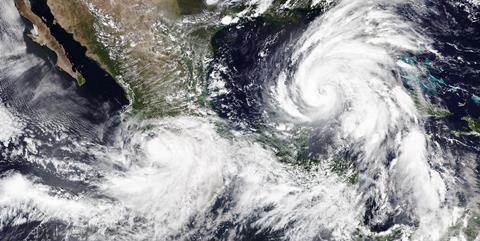Insurers most exposed to the storm are Florida-only carriers, the ratings agency emphasised.
On 26 September, Hurricane Helene struck Florida’s Big Bend as a category four storm, causing destructive winds, storm surge and heavy rainfall leading to property damage, mandatory evacuations, power outages, and tragic loss of life.

After Florida, the storm moved through surrounding states causing significant flooding, according to a new briefing from Moody’s Ratings.
Helene is generating potentially significant losses for property and casualty (P&C) (re)insurers, mainly in homeowners and commercial property lines, and to a lesser extent in automobile and marine lines.
It will take weeks or months for insurers to have reliable estimates of incurred losses, Moody’s cautioned.
Hurricane Helene follows Hurricane Debby, which made landfall on August 5 as a category one storm in Florida’s Big Bend region and Gulf Coast.
According to Moody’s RMS, US private market insured losses from Hurricane Debby “will not exceed $1.5bn”.
In 2023, Hurricane Idalia, a category three storm, also hit Florida’s Big Bend, inflicting economic losses of $3.5bn and insured losses of $1.5bn, according to re/insurance broker Aon.
Most exposed
Insurers most exposed to the storm are Florida-only carriers, which Moody’s defines as insurance companies with at least 75% of their homeowners and commercial property premiums written in the state.
The top 10 Florida-only insurers (see table below) write about 50% of the state’s homeowners business “and are more vulnerable than others given their geographic concentration”, the rating agency added.

State government-owned not-for-profit insurer Citizens Property Insurance Corporation (Moody’s A1 rated, under review for upgrade) is the largest Floridaonly insurer, the ratings agency observed.
“As the state’s insurer of last resort, Citizens has significant exposure along the state’s coastline, although the company is less concentrated in the Big Bend region where the eye of the storm passed through,” Moody’s said.
“With $15bn of readily available claims paying resources, Citizens is well positioned to manage the losses from Hurricane Helene. Florida-only companies manage their hurricane exposure by purchasing extensive property catastrophe reinsurance, which exposes their claims-paying ability to counterparty credit risk from reinsurers following a large storm,” the report added.
According to Moody’s, large national homeowners insurers such as State Farm and Allstate Corporation (rated A3 negative by Moody’s) are also exposed.
“However, these companies carefully monitor their exposures and are geographically diversified across the US. The top 10 homeowners insurers nationally generate just over 4% of their aggregate homeowners premiums in Florida,” the briefing said.
“We expect these large national carriers will be able to absorb the hurricane-related losses, given their considerable resources, high quality reinsurance protection and large capital bases.
Sharing the burden
Depending on the severity of losses, primary insurers would share the loss burden with traditional reinsurers, particularly through quota share arrangements, Moody’s noted.
“Reinsurers’ losses related to Helene will depend on the underlying primary insurance coverages and the reinsurance contracts,” Moody’s said.
“The Florida Hurricane Catastrophe Fund (Florida’s State Board of Administration Finance Corporation Aa3 review for upgrade) provides up to $17bn of reinsurance protection to insurers in Florida, with readily available cash reserves of $6.9bn as of the start of the season,” the ratings firm continued.
Homeowners policies, including those provided by Citizens, usually exclude coverage for flood damage, Moody’s observed.
As a result, the ratings firm noted that homeowners in flood zones often get coverage through the government-backed National Flood Insurance Program, a division of the Federal Emergency Management Agency (FEMA).
“Following past hurricanes, FEMA has helped repair or replace homes for uninsured or underinsured residents. Flood coverage can be contentious when it is unclear whether wind or water has caused damage to a home. Coverage for commercial properties is provided by a mix of regional, national and international insurers, generally covering midsize to large businesses,” Moody’s said.
Smaller businesses are often insured by companies that operate exclusively in Florida, Moody’s noted.
“Beyond property damage, commercial property claims typically involve business interruption losses. Predicting these losses can be challenging because they depend on specific provisions within policies,” said Moody’s.
“Direct business interruption is covered only if the damage to the business premises is caused by a covered peril. Commercial property insurers may face flood losses if insured businesses have purchased optional flood coverage,” the ratings firm added.










No comments yet